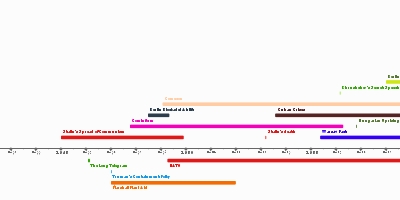The Prague Spring (jan 5, 1968 – aug 21, 1968)
Description:
Background• Hardline Communist leader Novotny was unpopular. His leadership was characterised with a lack of civil liberties and censorship.
• The Czech economy was weak and standard of living was low. Efforts towards modernising farming were frowned upon. Czechs were angry the USSR controlled their economy for its own benefit.
Events
• In 1967, Czech students peacefully demonstrated against Novotny. Novotny asked for Brezhnev to help supress the protests, but he refused. Novotny was replaced with Dubcek by Brezhnev.
• In April 1968, Dubcek announced an Action Plan to deliver “Socialism with a human face”. This entailed 5 steps: Greater political freedom, 10-year programme of change – moving towards democratic socialism, reduction in powers of secret police, remove of travel restrictions and greater rights to workers and trade unions.
• Dubcek’s reforms began worrying the Soviets, as although he was a committed communist, he proposed allowing non-communist political parties to form and run in elections.
• Despite making it clear Czechoslovakia would remain in the Warsaw pact, Dubcek met with Tito, who wasn’t a member of the Warsaw Pact and someone Moscow was wary of.
Invasion
• Brezhnev declared that the USSR would not allow the countries of Eastern Europe to reject communism ‘even if it meant a third World War’. This became known as the Brezhnev Doctrine.
• On August 20th, 1968, Soviet-Led Warsaw Pact forces numbering around 250,000 invaded Czechoslovakia, alongside 2000 tanks.
• Dubcek called upon the Czech people to not resist. Instead, Czechs threw flowers at tanks, offered them to soldiers and stood in front of tanks. One student activist would burn himself to death in a square in Prague.
• Dubcek was arrested and taken to Moscow.
• Pro-Soviet Husak became the new leader, he would reverse Dubcek’s reforms.
• The west made no attempt to aid the Czechs, even though many Czechs thought they would.
• 100 civilians would die. Only one Warsaw Pact soldier would die.
Brezhnev Doctrine (1968)
• Stated that the USSR had the right to invade any country in its sphere of influence which threatened the stability of eastern Europe.
• Created by Brezhnev (64-82)
• Introduced after the Prague Spring as he realised, he could not allow reforms in other eastern European socialist states.
• Countries in Eastern Europe now had to obey strict Soviet rule or risk invasion.
• September.
• Communist reaction:
• Poland and East Germany welcomed it because they were attempting to control reformers in their nations.
• Romania and Yugoslavia heavily disliked. They tried to distance themselves from the USSR.
• China did not like it as it only gave the USSR the right to intervene. Led to deterioration of relations.
• Western reaction:
• Condemned by the US
• Communist parties in democratic west were shocked and broke away from the USSR communist party.
• Condemned by the UN.
Added to timeline:
Date:
jan 5, 1968
aug 21, 1968
~ 7 months
